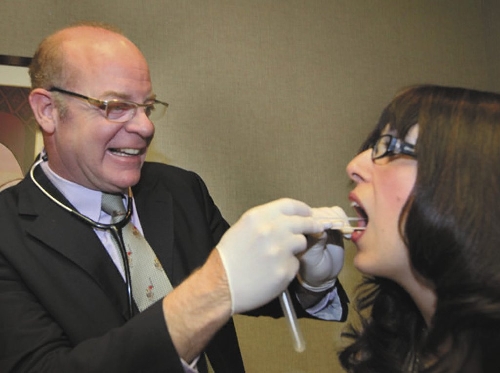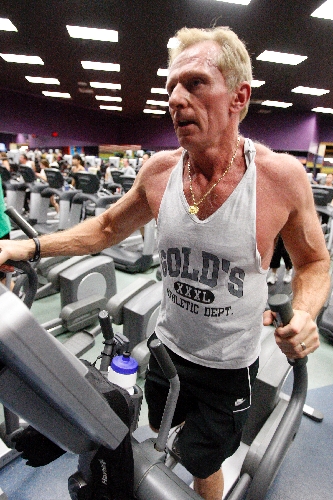DNA-driven diets, fitness plans catch on



As macho body builders jockey for the perfect parking space close to the gym, Bob Risner smiles and walks from the back of the lot to his workout.
Risner, a 56-year-old retired physician, knows there is no short-cut to fitness. But he is not above getting a little help from science. His exercise regime, like his diet, is tailored to his DNA through genetic testing.
No longer, he said, should we think of gene testing only for finding risk for things such as Alzheimer’s disease, cancer and diabetes.
"We should be able to take advantage of the latest science in ways that we normally don’t think of," Risner said. "We can do things smarter."
Physician-supervised, DNA-driven diet and fitness plans have been offered for about two months by the TrimCare weight management clinic in Las Vegas. About 50 patients have begun the program. Risner, one of its first DNA diet patients, has lost about 2 percent body fat in five weeks.
Is it possible now to match the "right" diet and fitness regimen to the "right" person through genetic testing that begins with a simple swab of the cheek?
Does a precise DNA test exist that helps predict which people will respond best to a low-fat diet, which people will respond best to a low-carb diet, and which people will do best with a diet somewhere in between?
To Risner, studies in the fast evolving field of nutrigenomics, the link between genes and nutrition, already explain a common phenomenon in the weight-loss battle: Why two people trying to lose weight go on the same diet and exercise plan, only to have one succeed while the other fails.
Chalk it up to the genotype.
RESEARCHERS CAUTIOUS
Yet researchers are far more cautious when they evaluate DNA diet studies.
Even Christopher Gardner, co-author of a famous 2010 Stanford University study which found that women on diets matched to their genes lost almost five times more weight, said his research was very promising but not conclusive.
The Stanford study, done in conjunction with Interleukin Genetics Inc., requires confirmation in a larger study, Gardner said. And additional research is necessary to determine the usefulness of the test, including how it applies to men and different racial groups.
"It’s exciting, it’s possible, but this area of study is in its infancy, " Gardner said. "We don’t want to be too positive too soon."
Raymond Rodriguez, director of the National Center of Excellence for Nutritional Genomics at the University of California, Davis, isn’t buying into the DNA diet without more research.
"To me, most of the genetic tests are too general in nature to be of value."
THE NEXT BIG THING
While scientists continue to test and decipher the evidence, the private sector has jumped on what it sees as the next big thing.
It has been touted on TV’s "The Dr. Oz Show" by Dr. Mehmet Oz, Oprah’s friend. The Internet is full of mail-order companies offering home test kits that allow customers to collect a sample of their own DNA with a cheek swab.
Those companies also ask customers to complete questionnaires that ask about diet, exercise and other lifestyle behaviors. Supposedly, people receive personalized nutrition advice to help them shed pounds more successfully.
Gregory Kutz, who directs special investigations for the U.S. Government Accountability Office, denounced the mail-order DNA firms at a congressional hearing in 2006.
After an investigation by his office, he said businesses made predictions that were medically unproven, ambiguous, and provided no meaningful information for consumers.
He told the Review-Journal he hopes companies doing mail-order genetic testing are more professional than they were five years ago.
PHYSICIAN’S SUPERVISION
The local TrimCare clinic, overseen by Drs. Jill Oliver and Ivan Goldsmith, uses a DNA-based program developed by YOUology, a Canadian-based company. Patients on its diet and exercise plans are monitored by physicians. An electrocardiogram, which checks for problems with the electrical activity of the heart, is done before the diet begins.
"That mail-order stuff, nobody oversees it," Goldsmith said.
DNA is swabbed from a patient’s cheek at the clinic. About a month later they receive their individualized program
"This program, based on the food you want to eat, literally lays out in a book prepared just for you just what amount you should daily eat to reach your desired realistic weight in 90 days — the correct ratio of fats, carbohydrates and protein you should consume, based on your genetic code," Oliver said, adding that written guides for five meals and a snack daily are provided along with detailed preparation instructions and weekly grocery lists.
"There’s nothing else like it," she said. "Nobody else gives you this kind of blueprint. Others give you test results and basically tell you to find your own way."
The program isn’t cheap, $699 for the DNA diet and $999 if it is coupled with the exercise regimen.
"That may seem like a lot to some people, but if you consider that this is the only diet you need for a lifetime — your genetic code isn’t going to change, it’s really not that much," said Maria Vega, a Las Vegas insurance agent who has lost 15 pounds and her husband has lost 17. "People change from one diet to another all the time and it costs more than that."
Goldsmith warned that the DNA diet isn’t a magic pill.
"The DNA diet is more about a lifestyle change than a diet," he said. "Are people willing to make permanent lifestyle changes rather than go on a temporary diet? That’s the question."
PROGRAM’S RUSSIAN FOUNDER
Alex Domnich, the Russian-born vice-president of YOUology, flew to Las Vegas recently from Edmonton, Alberta, to explain how his company’s DNA diet and fitness program works.
From among hundreds of genes believed to be involved with obesity, researchers from his company identified four genes that had been implicated in multiple clinical studies to play a role in weight management, Domnich said.
Individuals pursing the DNA diet are tested for each. He said three of the four genes are the same as what Interleukin Genetics Inc. identified for the Stanford study. His company also tests for another gene "to be even more precise."
"Our test finds out a person’s exact genotype for each of these genes," Domnich said. "We can tell how an individual’s metabolism works on a cellular level. We can define an individual’s level of sensitivity to carbohydrates and fats. Based on this information, our dietician creates diet and meal plans with precise proportions of carbohydrates, fats and proteins for an individual’s genotype."
Domnich said his company has also identified five genes that help regulate physical activity, including those that deal with a person’s aerobic (running) and anaerobic (weightlifting) metabolism and uptake of oxygen.
While Domnich concedes many more genes are involved in both diet and exercise, he is confident his company’s researchers have found the most critical ones.
THE CUTTING EDGE
For Risner, a former obstetrician and gynecologist who now consults with physicians on the best way to run their practices, the evidence from the Stanford study has given him faith in YOUology’s work.
Risner said he remembers how surgeons, without having multiple confirming studies done, began to do lumpectomies rather than mastectomies for breast cancer.
"Early studies indicated that with the proper auxiliary treatment they would work, and they did," he said. "There was risk in that and I just don’t see the risk in this."
Even if the DNA diet pans out as early research suggests, Stanford researcher Garner cautions that just matching the right diet with your genes doesn’t guarantee weight loss for everyone If low carb people make a diet out of low carb donuts, for example, they are not likely to beat the battle of the bulge.
"This would not be an excuse to eat this kind of crap and not this kind of crap," he said.
Contact reporter Paul Harasim at pharasim@reviewjournal.com or 702-387-2908.












